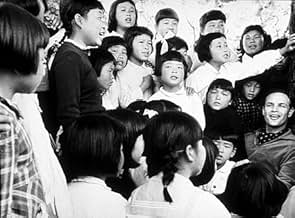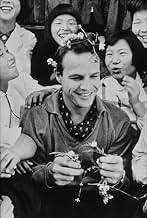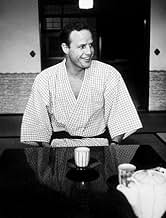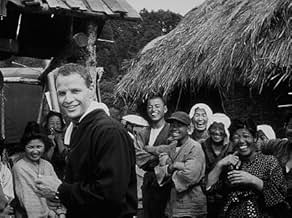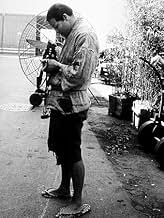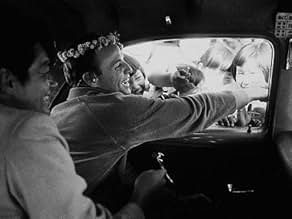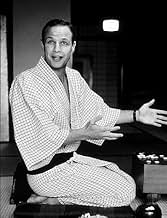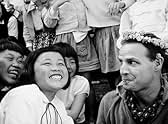CALIFICACIÓN DE IMDb
6.6/10
3.9 k
TU CALIFICACIÓN
En el Japón posterior a la Segunda Guerra Mundial, un capitán estadounidense llega para ayudar a construir una escuela, pero los lugareños quieren una casa de té en su lugar.En el Japón posterior a la Segunda Guerra Mundial, un capitán estadounidense llega para ayudar a construir una escuela, pero los lugareños quieren una casa de té en su lugar.En el Japón posterior a la Segunda Guerra Mundial, un capitán estadounidense llega para ayudar a construir una escuela, pero los lugareños quieren una casa de té en su lugar.
- Premios
- 1 premio ganado y 9 nominaciones en total
Machiko Kyô
- Lotus Blossom
- (as Machiko Kyo)
Harry Morgan
- Sgt. Gregovich
- (as Henry {Harry} Morgan)
Carlo Fiore
- Soldier
- (sin créditos)
John Grayson
- Soldier
- (sin créditos)
Harry Harvey Jr.
- Soldier
- (sin créditos)
Miyoshi Jingu
- Old Woman on Jeep
- (sin créditos)
Roger McGee
- Soldier
- (sin créditos)
Dansho Miyazaki
- Sumata's Father
- (sin créditos)
Minoru Nishida
- Mr. Sumata
- (sin créditos)
Aya Oyama
- Daughter on Jeep
- (sin créditos)
Opiniones destacadas
I have spent many years on Okinawa and am always amazed at Brando's ability to create a character (Sakini) that is true to the Okinawan character. I have watched it many times over and enjoy it every time. When I'm asked why I visit Okinawa so often, I usually loan them my copy of "Teahouse" and wait for a response. It is a story of a resilient and happy people who have retained their culture, through many invasions. Brando's monologue at the beginning and end of the film masterfully explains it all. The kids will like it and adults should get a laugh while watching the arrogant victors being steered to the Okinawan's needs in a hilarious manner. It's not quite history and it's not quite fantasy, but it's all good fun.
Casting Marlon Brando in this film as Sakini, a Japanese interpreter for American troops in post WW-II Japan is considered by many critics and film historians alike as one of the worst casting errors ever made in a film history. In my opinion, though, Marlon Brando is the one responsible for turning this quite an average film into a hillarious comedy. Yes, they really did it. With a little bit of make up and great effort from actor's part to learn Japanese mannerism and language in order to get an accent in his speech we have here Marlon Brando in his most unimaginable role. The rest of the cast is also quite good, namely Paul Ford as Colonel Waiwright Purdy III, a somehow cliche figure of stubborn, narrow minded US military officer and Glenn Ford by his side as Captain Fisby, for whom Brando's character Sakini ends up working as an interpreter and, of cause, unforgettable Machiko Kyo, as a spirited geisha, whom lovers of Japanese cinema must remember from Akira Kurosawa's films.
Directed by Daniel Mann (Butterfield 8, Come Back, Little Sheba) and based on John Patrick's stage play that was a big hit on Broadway at it's time, The Teahouse of the August Moon is slow in parts and in terms of some aspects of the story considerably aged and outdated but still funny and entertaining movie. 8/10
Directed by Daniel Mann (Butterfield 8, Come Back, Little Sheba) and based on John Patrick's stage play that was a big hit on Broadway at it's time, The Teahouse of the August Moon is slow in parts and in terms of some aspects of the story considerably aged and outdated but still funny and entertaining movie. 8/10
For a guy who had some heavy duty roles,Waterfront,Sreetcar etc. this role was a real challenge for Brando and he is fabulous and steals movie although Glenn Ford is great too. This shows Brando's brilliance as an actor not that there was ever any doubt but this early in his career to take this comedic challenge shows his versatility. Is Glenn Ford ever bad? I don't think he gets the credit for all his talent. This movie probably could not be made today a victim of PC. Must have Asian play Asian and don't offend the the Japanese although the only people made to look like fool were the Americans which is fine with me because it's a comedy and people are suppose to look foolish. Never on, but caught on TCM.
Marlon Brando was amazing in this film. I saw the comments made on TCM before they started the film and they said he saw the stage play and begged Paramount (?) to let him have a part in it when they made the film. They said he could have any part he wanted and he picked Sakini, the translator. As a Japanese teacher I want to tell you that I was stunned at his perfect accent! He spoke English exactly as a native Japanese person would. If I hadn't been told ahead of time that it was Marlon Brando, there is no way you could have convinced me that it wasn't a native Japanese actor doing the part. I could see that an attempt was made to make the natives look uneducated and doltish, but having lived in Japan for a year and a half, I simply couldn't see them that way. All you have to do is take a few minutes to watch any people and see the intelligence in their eyes and in their mannerisms and you can see how intelligent they really are whether YOU understand their language or not!
I just had the chance to see this charming movie again in widescreen format in what evidently is a new or restored print on Turner Classic Movies, and I'm realizing that I love the flick more and more each time I see it. The wonderful cast - Glenn Ford, Paul Ford (ironic - no relation!), Eddie Albert, Marlon Brando and Harry Morgan - do a fine job of playing out the movie's humorous meditation on culture clash, and the ability of a strong but flexible people to maintain their Eastern ways in the face of Western "aid". Brando, in particular, is surprising; this is about as far from Stanley Kowalksi or Terry Malloy as you can get, and one would not think him able to do much with a humorous, cross-racial characterization, yet the brilliant and convincing manner in which he pulls it off reminds us of the great thespian talent he once possessed and which he tended to squander as his life progressed. I believe this film had its origins in a very successful stage play; we can thank the forces involved for committing this funny, charming, and ultimately heart-warming story to celluloid. Best line: "I've come to a state of gracious acceptance somewhere between my ambitions and my limitations."
¿Sabías que…?
- TriviaProduction began with Louis Calhern playing Col. Purdy, but Calhern died after more than a month of filming. Paul Ford was quickly recruited, as he had created the role on Broadway, and this resulted a revived career for the lovable, irascible character actor.
- ErroresWhile Fisby and Sakini are finishing up their first address to the villagers Sakini asks Fisby what time it is. He responds that it's a quarter to 5:00. But the sun is directly over their heads as if it were noon.
- ConexionesFeatured in Okinawa: Keystone of the Pacific (1973)
- Bandas sonorasSakura Sakura (Cherry Blossoms)
(uncredited)
Written and Arranged by Kikuko Kanai
Sung by Lotus Blossom
Selecciones populares
Inicia sesión para calificar y agrega a la lista de videos para obtener recomendaciones personalizadas
Detalles
- Fecha de lanzamiento
- País de origen
- Idiomas
- También se conoce como
- Cajdzinica na avgustovskoj mesecini
- Locaciones de filmación
- Productora
- Ver más créditos de la compañía en IMDbPro
Taquilla
- Presupuesto
- USD 3,926,000 (estimado)
- Tiempo de ejecución2 horas 3 minutos
- Mezcla de sonido
Contribuir a esta página
Sugiere una edición o agrega el contenido que falta

Principales brechas de datos
By what name was The Teahouse of the August Moon (1956) officially released in India in English?
Responda

